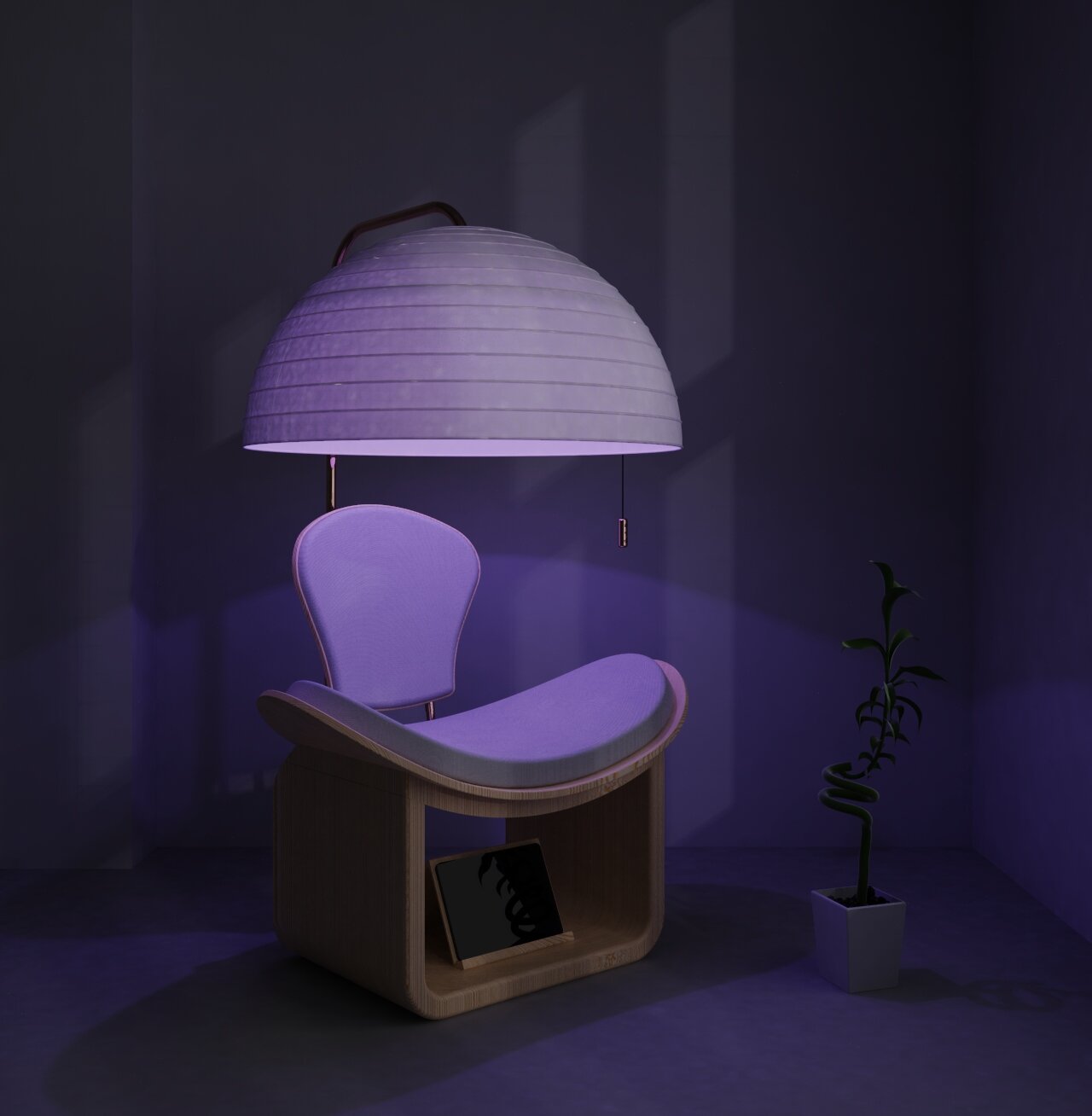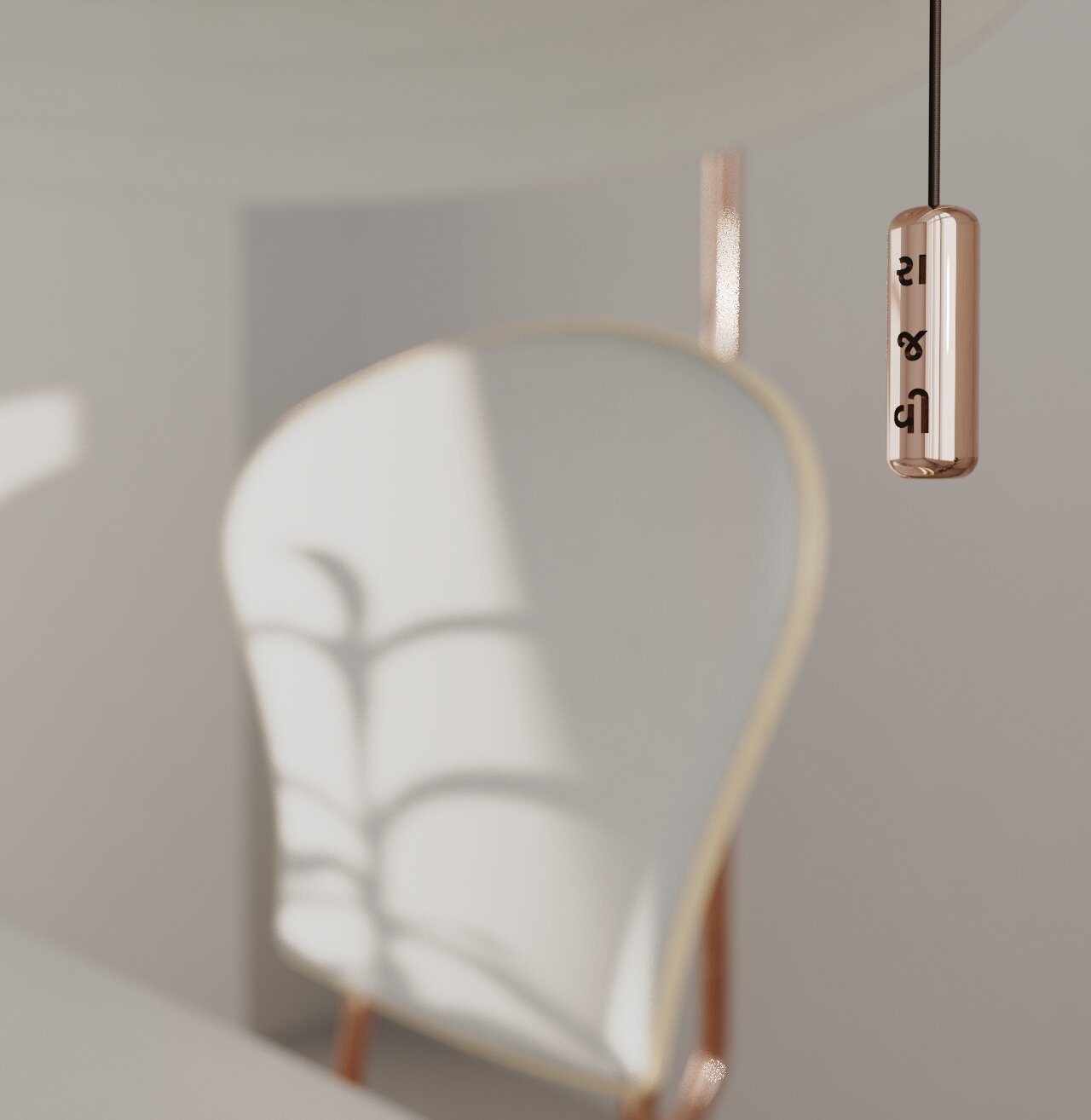
Shanti: The Meditation Pod.
Stress, depression and anxiety accounts for 51% of all work-related ill health in the UK and almost 18 million working days lost. These mental health issues are highest in public service industries such as education, healthcare and social care. (HSE Gov. 2019/20). By designing a meditation pod to use in the workplace, professionals are able to alleviate stress, escape and unwind for a few moments during their day. Over time, this practice can help shift the mind and body out of the stress response and into a state of relative calm, by controlling how they respond to the triggers that often lead to depression.
Shanti is a multifunctional piece of furniture, providing sound and light therapy, privacy and storage. Users can decide their own level of privacy by pulling the handle to adjust the shade height. Sound and light therapy are utilised through a tablet, with endless guided meditations and music to sync with headphones which store neatly underneath the seat, and controllable colour changing LED lights.




“Within you is a stillness and a sanctuary to which you can retreat at any time and be yourself.”
— Hermann Hesse
Human beings innate connection to nature brings them peace and comfort, so I decided to delve into the world of biomimicry for inspiration when designing the form of the pod. The shape of the seat was inspired by the lotus flower which is a spiritual symbol in Hinduism and Buddhism due to its growth process and how it mirrors our own spiritual journeys. The lotus grows from murky water yet blooms spotless upon the surface; this represents human beings before and after enlightenment, and is also a symbol of non-attachment, purity and faith in oneself to rise above the ‘mud’.
There is a metaphor about how a caterpillar transforms into a butterfly as it draws a parallel to the transformation of human suffering to healing, which resonates with the concept of using meditation as a practice to transition the mind into a higher state. The caterpillar goes through this growth process inside a chrysalis, which was one of the inspirations behind the privacy shade design.
Alongside the chrysalis concept, Japanese zen gardens were studied as they are sanctuary for monks to meditate in. They are not conventional gardens, as they use little greenery and replace it with sand and rocks. Monks rake the sand to produce lines, which imitate water and have a calming effect on the mind. These lines in combination with the lines on the chrysalis inspired the final design of the privacy shade.


“Our culture, so proud of its mind-over-matter philosophy, cuts us off from our bodily experience and from the earth itself. Our ground is our form, and without it we lose our individuality.”
— Anodea Judith (Eastern Body, Western Mind 1996).
Judith explains that individuals are disconnected from their innate connection to the earth which has a number of consequences impacting on spiritual and mental health. The fast paced nature of life and the evolution of technology has provided more distractions than ever before, making it difficult for people to withdraw and switch off for a few moments. Within the busyness of the work day, often space is needed to breathe, slow down and reconnect with the mind, body and soul.


“Simplicity means the achievement of maximum effect with minimum means.”
— - Dr. Koichi Kawana
Every detail of Shanti was designed with peace and comfort in mind. The soft curved shapes throughout the form create a safe atmosphere for the user to escape the outside, and enter their journey within. The materials were selected with Feng Shui elements in mind (wood, metal, fire) to create a sense of balance. Biomimicry was used by drawing inspiration from the lotus flower and butterfly chrysalis, due to their transformation between different states, which draws a parallel to the human states of suffering and enlightenment.
The 50mm cushion ensures maximum comfortability during meditation to support the knees in the lotus position, as well as the 105 degree angle of the backrest which is optimum for lower back support. By providing mindfulness apps via the tablet to aid meditation, psychological well-being can be improved resulting in reduce job strain, and reduced ambulatory blood pressure during the workday.


